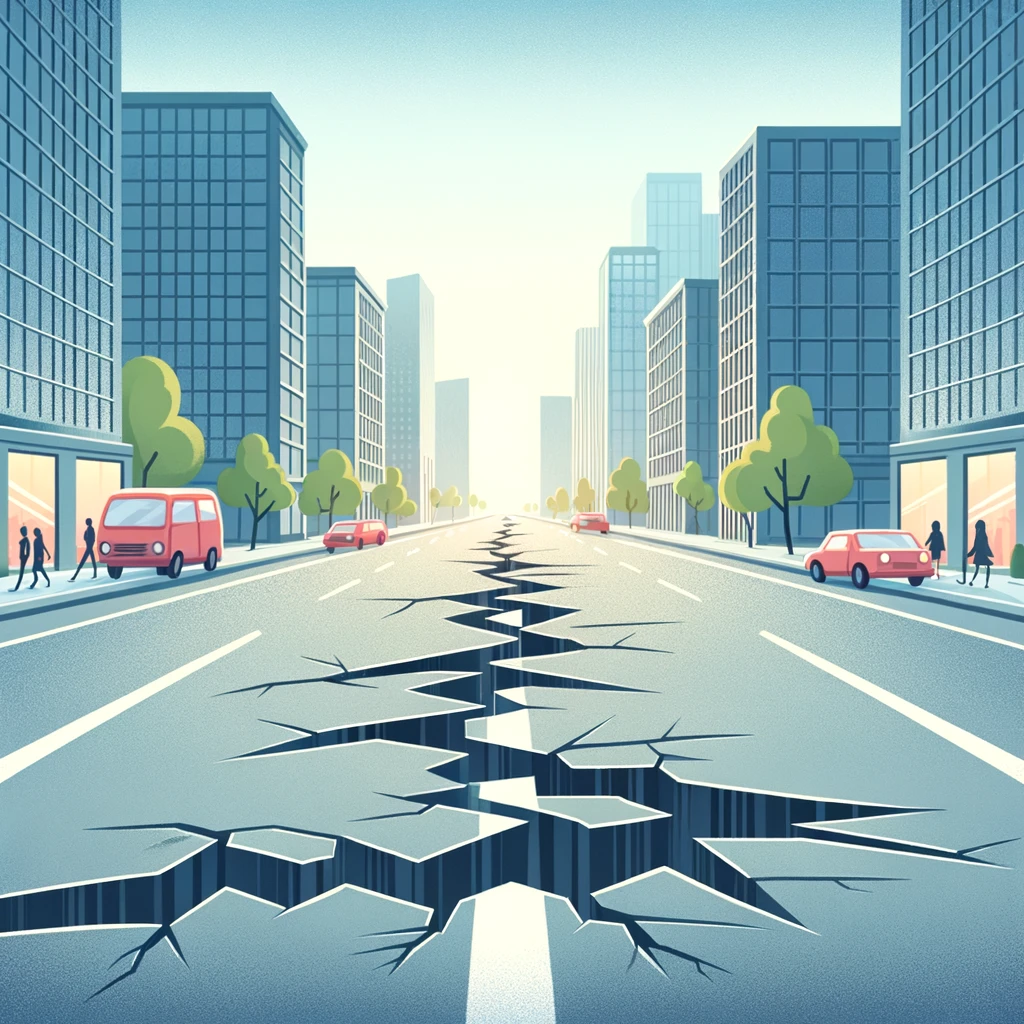英語で能登半島地震発生と地震の基本情報を紹介します。
実際の英会話例とともに、地震についての基本情報を英語で解説。
“関連情報”では、英語で地震にまつわる情報・知識・表現などを紹介します。
※後ろに和訳付の英文があります。
英語
会話 / conversation

Did you hear about the earthquake in Ishikawa Prefecture?
It was a magnitude 7.6!

Yes, it’s all over the news.
Such a tragedy to start the new year.
The images of the landslides and building collapses are shocking.

I was reading that the tsunami warning caused a lot of panic, but thankfully, the highest wave was just over 1.2 meters.
It could have been much worse.

True.
And it’s impressive how quickly the government responded.
They’ve already set up an emergency disaster response headquarters.

The aftershocks worry me, though.
There have been over 129 already.
It must be terrifying for the people there.

Absolutely.
And with the disrupted transport and utilities, getting aid to those in need must be challenging.
I heard some areas are without power and water.

I can’t imagine.
It’s a reminder of how powerful nature can be.
Do you think this will affect our region too?

It might.
We should stay informed and be prepared, especially with the forecasted rain.
They’re warning of possible landslides.

Right, we should.
Let’s keep an eye on the news and stay safe.
My thoughts are with everyone affected by this disaster.
関連情報 / related information

Introduction to Earthquakes in Japan
Japan is one of the most earthquake-prone countries in the world. Located on the Pacific “Ring of Fire,” it experiences a high number of earthquakes every year. These earthquakes range from small tremors to large, destructive ones.
Causes of Earthquakes
The main reason for these frequent earthquakes is Japan’s position on several tectonic plates, including the Pacific Plate and the Philippine Sea Plate. When these plates shift or collide, they cause earthquakes.
Historical Earthquakes
Japan has faced many significant earthquakes throughout history. One of the most devastating was the Great East Japan Earthquake in 2011. It caused a massive tsunami and led to the Fukushima nuclear disaster.
Preparedness and Response
The Japanese government and people are well-prepared for earthquakes. Buildings are designed to withstand tremors, and regular drills are conducted. After an earthquake, emergency services act quickly to provide aid and assess damage.
Impact on Daily Life
Earthquakes impact daily life in Japan. They can disrupt transportation, utilities, and even lead to evacuations. Despite this, the Japanese have adapted remarkably to living with the constant threat of earthquakes.
Conclusion
Living with earthquakes is a part of life in Japan. Through advanced technology and preparedness, the country continues to manage and reduce the impact of these natural disasters.
和訳付
会話 / conversation

Did you hear about the earthquake in Ishikawa Prefecture?
It was a magnitude 7.6!
石川県で起きた地震のこと聞いた?
マグニチュード7.6だったんだよ!

Yes, it’s all over the news.
Such a tragedy to start the new year. T
he images of the landslides and building collapses are shocking.
うん、ニュースで見たよ。
新年早々、こんな悲劇が起きるなんて。
土砂崩れや建物の倒壊の映像が衝撃的だった。

I was reading that the tsunami warning caused a lot of panic, but thankfully, the highest wave was just over 1.2 meters.
It could have been much worse.
津波警報が出て、かなりのパニックになったらしいけど、幸いにも最高波高は1.2メートルちょっとだったんだって。
もっとひどいことになってもおかしくなかったよね。

True.
And it’s impressive how quickly the government responded.
They’ve already set up an emergency disaster response headquarters.
本当だね。
政府の迅速な対応には感心するよ。
すでに緊急災害対策本部が設置されてるって。

The aftershocks worry me, though.
There have been over 129 already.
It must be terrifying for the people there.
でも、余震が心配だな。
もう129回以上あったんだろ?
あそこの人たちにとっては恐怖でしかないよね。

Absolutely.
And with the disrupted transport and utilities, getting aid to those in need must be challenging.
I heard some areas are without power and water.
間違いないね。
交通機関やライフラインが寸断されて、必要としている人たちに援助を届けるのが大変そう。
電気や水が使えない地域もあるって聞いたよ。

I can’t imagine.
It’s a reminder of how powerful nature can be.
Do you think this will affect our region too?
想像もつかないよ。
自然の力は本当に強大だってことを思い知らされるね。
うちの地域にも影響あると思う?

It might.
We should stay informed and be prepared, especially with the forecasted rain.
They’re warning of possible landslides.
あるかもしれないね。
情報を常にチェックして、準備しておくべきだね、特に予報で雨が降るって言ってるし。
土砂崩れの可能性に警戒してるって。

Right, we should.
Let’s keep an eye on the news and stay safe.
My thoughts are with everyone affected by this disaster.
そうだね、そうしよう。
ニュースを見て、安全に過ごそう。
この災害に影響を受けた全ての人たちを思ってるよ。
関連情報 / related information

Introduction to Earthquakes in Japan
Japan is one of the most earthquake-prone countries in the world. Located on the Pacific “Ring of Fire,” it experiences a high number of earthquakes every year. These earthquakes range from small tremors to large, destructive ones.
日本は世界で最も地震が多い国の一つです。太平洋の「火の輪」に位置しており、毎年多くの地震が発生します。これらの地震は小さな揺れから大きく破壊的なものまで様々です。
Causes of Earthquakes
The main reason for these frequent earthquakes is Japan’s position on several tectonic plates, including the Pacific Plate and the Philippine Sea Plate. When these plates shift or collide, they cause earthquakes.
これらの頻繁な地震の主な原因は、日本が太平洋プレートやフィリピン海プレートを含むいくつかのプレートの上に位置していることです。これらのプレートが移動または衝突すると、地震が発生します。
Historical Earthquakes
Japan has faced many significant earthquakes throughout history. One of the most devastating was the Great East Japan Earthquake in 2011. It caused a massive tsunami and led to the Fukushima nuclear disaster.
日本は歴史を通じて多くの重大な地震に直面してきました。最も壊滅的だったのは2011年の東日本大震災です。これは巨大な津波を引き起こし、福島の原子力災害につながりました。
Preparedness and Response
The Japanese government and people are well-prepared for earthquakes. Buildings are designed to withstand tremors, and regular drills are conducted. After an earthquake, emergency services act quickly to provide aid and assess damage.
日本政府と国民は地震に対して十分に備えています。建物は揺れに耐えられるように設計されており、定期的に訓練が行われます。地震の後、緊急サービスは迅速に救援を提供し、被害を評価します。
Impact on Daily Life
Earthquakes impact daily life in Japan. They can disrupt transportation, utilities, and even lead to evacuations. Despite this, the Japanese have adapted remarkably to living with the constant threat of earthquakes.
地震は日本の日常生活に影響を及ぼします。交通機関や公共サービスの中断、さらには避難を余儀なくされることもあります。それにもかかわらず、日本人は常に地震の脅威と共に生きることに驚くほど適応しています。
Conclusion
Living with earthquakes is a part of life in Japan. Through advanced technology and preparedness, the country continues to manage and reduce the impact of these natural disasters.
地震と共に生きることは、日本での生活の一部です。先進技術と備えを通じて、国はこれらの自然災害の影響を管理し、軽減し続けています。
words & phrases
英会話ダイアローグと関連情報に出てきた単語・フレーズです(例文は各3つ)。

landslide
意味: 土砂崩れ。大量の土砂が斜面を滑り落ちること。A movement of a large amount of earth and rocks down a mountain or hillside.
例文:
The earthquake triggered several landslides in the area.
地震によりその地域でいくつかの土砂崩れが起きた。
After heavy rains, the village was at risk of a landslide.
大雨の後、その村は土砂崩れの危険にさらされていた。
The construction project was delayed due to a landslide.
土砂崩れのために建設プロジェクトが遅れた。
aftershock
意味: 余震。A smaller earthquake following the main shock of a large earthquake.
例文:
The region experienced numerous aftershocks following the major earthquake.
その地域は大地震の後、多くの余震を経験した。
Residents were advised to stay alert for possible aftershocks.
住民は余震に注意するようにアドバイスされた。
Aftershocks can continue for days or even weeks after the initial quake.
余震は初期の地震の後、数日間または数週間続くことがある。
collapse
意味: 崩壊。構造物などが急に破壊されて崩れ落ちること。The sudden failure and falling apart of a structure.
例文:
The building’s collapse was caused by structural weaknesses.
建物の崩壊は構造的な弱点によるものだった。
The earthquake led to the collapse of several bridges.
地震によりいくつかの橋が崩壊した。
Emergency services rushed to the site of the collapse.
緊急サービスが崩壊現場に急行した。
utility
意味: 公共事業。電気、ガス、水などの基本的なサービス。Basic services such as electricity, gas, water, etc., provided to homes and businesses.
例文:
The storm caused a major disruption to utilities in the city.
嵐により市内の公共事業に大きな混乱が生じた。
Residents were without utility services for several days.
住民は数日間、公共サービスが利用できなかった。
Utility workers are working hard to restore power and water supply.
公共事業の作業員たちは電力と水道の供給を復旧させるために一生懸命働いている。
tremor
意味: 地震の震動。地面が軽く震える現象。A shaking movement of the ground, usually caused by an earthquake.
例文:
The tremor was felt throughout the city.
その震動は市全体で感じられた。
Minor tremors are common in this region.
この地域では小さな震動がよく起こる。
We experienced a series of tremors last night.
昨夜、一連の震動があった。
destructive
意味: 破壊的な。大きな損害や破壊を引き起こす性質や効果を持つ。Causing great damage or destruction.
例文:
The hurricane was highly destructive.
そのハリケーンは非常に破壊的だった。
Destructive behavior can have serious consequences.
破壊的な行動は深刻な結果をもたらすことがある。
The earthquake’s destructive force leveled buildings.
地震の破壊力が建物を平らにした。
tectonic plate
意味: テクトニックプレート。地球の表面を形成する大きな岩石の板。Large slabs of rock that form the surface of the Earth.
例文:
The movement of tectonic plates causes earthquakes.
テクトニックプレートの動きが地震を引き起こす。
Japan is located on several tectonic plates.
日本はいくつかのテクトニックプレートの上に位置している。
Tectonic plate shifts can be gradual or sudden.
テクトニックプレートの移動は徐々にまたは突然起こることがある。
collide
意味: 衝突する。力強くぶつかること。To hit something with force while moving.
例文:
The two cars collided at the intersection.
その二台の車は交差点で衝突した。
Atoms collide in a particle accelerator.
原子加速器内で原子が衝突する。
Tectonic plates collide, causing seismic activity.
テクトニックプレートが衝突し、地震活動を引き起こす。
assess
意味: 評価する、査定する。何かの価値や性質、または重要性を判断すること。To evaluate or estimate the nature, ability, or quality of something.
例文:
We need to assess the situation before making a decision.
決定をする前に状況を評価する必要がある。
The teacher assessed the students’ projects.
教師は生徒たちのプロジェクトを評価した。
Emergency teams assessed the damage after the earthquake.
緊急救助チームは地震の後、被害を評価した。
disrupt
意味: 混乱させる、妨げる。通常の進行や秩序を中断または混乱させること。To interrupt the normal course or unity of something.
例文:
The snowstorm disrupted travel plans.
大雪で旅行計画が混乱した。
A power outage disrupted the city’s traffic system.
停電が市の交通システムを混乱させた。
The earthquake disrupted utilities like water and electricity.
地震により水道や電気などの公共サービスが中断された。
